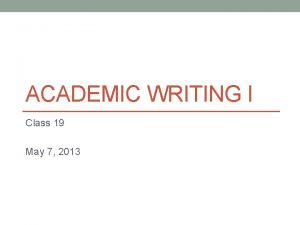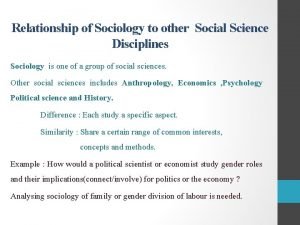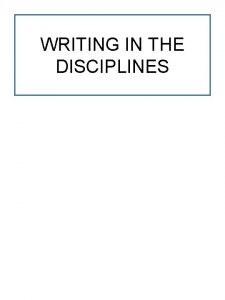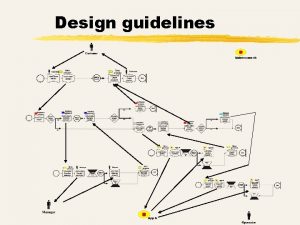WRITING IN THE ACADEMIC DISCIPLINES GUIDELINES FOR ACADEMIC







- Slides: 7

WRITING IN THE ACADEMIC DISCIPLINES

GUIDELINES FOR ACADEMIC WRITERS Become familiar with the methodology and the kinds of evidence for the discipline in which you are writing. Analyze the special demands of each assignment. The questions you set out to answer, the assertions you wish to support, will govern how you choose your sources and evidence. Become familiar with the discipline’s specialized tools and language. Use the discipline’s style for source citations and document format. 49. 1

QUESTIONS FOR ANALYZING FICTION What happens in the story? Summarize the plot Think about what your summary leaves out Is the story told in chronological order, or are there flashbacks or flashforwards? On rereading, what foreshadowing do you detect? What conflicts does the work include? How does the writer develop characters? Explicit comment? Through action? With which characters do you sympathize? Are the characters plausible? What motivates them? What do minor characters contribute to the work? 50. 1 a

QUESTIONS FOR ANALYZING FICTION (continued) Who tells the story? Is the narrator a character, or entirely outside the character’s world? What does the narrator’s point of view contribute to the story’s theme? What is the setting? What do time and place of the action contribute to the work? Are certain characters, settings, or actions symbolic? What is theme? Does it reinforce your values, or does it challenge them? Is the title informative? Did its meaning change for you after you read the work? 50. 1 b

QUESTIONS FOR ANALYZING POETRY What parts of the poem interest or puzzle you? What words seem especially striking or unusual? How can you describe the poem’s speaker? What tone or emotion do you detect? What is the structure of the poem? Are there stanzas? If so, how is the thought related to the stanzas? What is theme of the poem? Is theme stated or implied? What images do you find? Is there a surprising pattern of images? What does the poem suggest symbolically as well as literally? 50. 2

QUESTIONS FOR ANALYZING DRAMA How does the plot unfold? Is it plausible? If not, is the implausibility a fault? If there is more than one plot, are the plots parallel, or are they related by way of contrast? Are certain happenings recurrent? What kinds of conflicts are in the play? How are conflicts resolved? Is the resolution satisfying to you? How does the author develop the characters? Do some characters serve as foils? Do the characters change during the play? What do the author’s stage directions add to your understanding and appreciation of the play? What do you make of the setting, or location? Does it help to reveal character or theme? Do certain costumes or properties strike you as symbolic? 50. 3

CONDUCTING A SURVEY Decide what you want to find out—what your hypothesis is. Define your population. Write your questions. Test your questions. Tally the results. Seek patterns in the raw data. 52. 1













